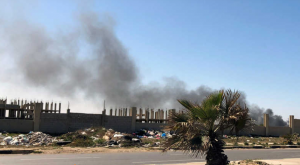Will the Libyan conflict lead to another faceoff between Turkey and Russia, similar to the one in Syria? It is a question that many in Turkey have been asking since the emergency security meeting that President Recep Tayyip Erdogan convened last week over the deployment of Russian warplanes to Libya from Syria. The arrival of the Russian jets complicated Turkey’s calculations soon after its allies seized a key air base near Tripoli, tipping the scales in the war thanks to Turkish military and intelligence support.
In fact, Ankara has long realized that Russia is the essential power it would have to deal with in Libya, no matter that it has been shaking its finger at Egypt and the United Arab Emirates as the main backers of renegade commander Khalifa Hifter and his Libyan National Army. This was already evident in January, when Moscow became the first go-to for Ankara after it signed two crucial deals with the Tripoli-based Government of National Accord and obtained parliamentary approval to deploy soldiers in Libya. Yet, a tentative Turkish-Russian deal on a cease-fire fell through Jan. 14 as Hifter refused to sign the agreement in a snub to Moscow, which has backed the Libyan National Army via the private military company Wagner, while maintaining diplomatic contacts with the Government of National Accord.
In a further sign of how Ankara feels pressed to deal with Moscow, Erdogan phoned Russian President Vladimir Putin on May 18, the day Turkey’s allies captured the al-Watiya air base, and Foreign Minister Mevlut Cavusoglu followed suit two days later, calling his Russian counterpart Sergey Lavrov.
The arrival of Russian jets in Libya, however, altered the situation anew.
The Government of National Accord’s interior minister said May 21 that at least six MiG-29s and two Su-24s had flown from the Khmeimim base in Syria to Hifter’s bases in eastern Libya. On the same day, Hifter’s air force commander threatened to unleash “the largest aerial campaign in Libyan history,” saying that all Turkish positions would be “legitimate targets.”

